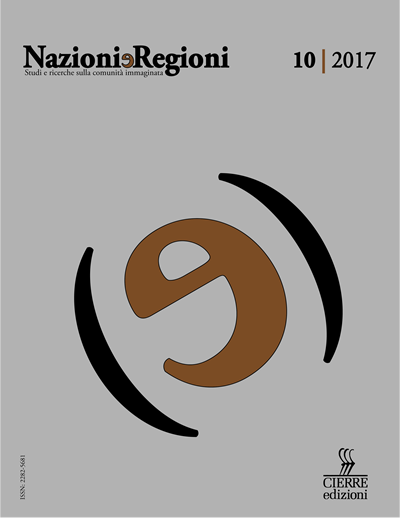Richard Rorty e il nazionalismo: il testo come bandiera per la Pax Americana
DOI:
https://doi.org/10.15162/2282-5681/1450Parole chiave:
Richard Rorty, filosofia, postmodernismo, pragmatismo, nazionalismo americano, sintassi dell’egemonia, philosophy, postmodernism, pragmatism, American nationalism, syntax of hegemonyAbstract
Richard Rorty è uno dei pochi pensatori di lingua inglese che i sostenitori del postmodernismo sentono di poter citare al fianco di icone come Foucault, Derrida e Baudrillard. La sua filosofia cattura l’umore del proprio tempo con la sua iconoclastia ironica e il suo rigetto di vecchie e perentorie certezze. Essa contiene tuttavia anche tematiche egemoniche: tramite un’attenta lettura dei testi di Rorty, l’articolo mette in evidenza il continuo ricorso di Rorty a una sintassi dell’egemonia e la sua implicita assunzione del punto di vista degli Stati Uniti, individuando nel loro schema filosofico il nazionalismo della Pax Americana. Questo nazionalismo, a differenza di altre forme precedenti, non parla a nome della nazione con una gretta ferocia, e trae invece la forza morale per guidare le altre nazioni dalla propria autoproclamata ragionevolezza, mentre le sue ambizioni globali sono presentate come la voce della tolleranza, persino del dubbio.
Nationalism and Richard Rorty: The Text as a Flag for Pax Americana
Abstract: Richard Rorty is one of the few English- language thinkers whom defenders of postmodernism feel able to cite alongside the icons of Foucault, Derrida and Baudrillard. His philosophy captures the mood of its times with its ironic iconoclasm and its rejection of old strident certainties. Yet, it also contains hegemonic themes: through a close reading of Rorty’s texts, the article highlights Rorty’s continual use of a syntax of hegemony and his implicit assumption of the American perspective, thus identifying in these texts the philosophical outline of Pax Americana. This nationalism, unlike some older forms, does not speak with narrow ferocity for the nation. Instead, it draws its moral force to lead the nations from its own proclaimed reasonableness, while its global ambitions are to be presented as the voice of tolerance, even doubt.
Riferimenti bibliografici
Anderson B. (2000), Comunità immaginate: origini e fortuna dei nazionalismi, trad. it. di M. Vignale, Manifestolibri, Roma [ed. or. 1983].
Barker M. (1981), The New Racism, Junction Books, London.
Bernstein R. (1987), «One Step Forward, Two Steps Backward: Richard Rorty on liberal democracy and philosophy», Political Theory, n. 15, pp. 538-563.
Bhaskar R. (1992), Philosophy and the Idea of Freedom, Blackwell, Oxford.
Billig M. (1992), Talking of the Royal Family, Routledge, London.
Billig M. (1995), Ideologia e opinioni: studi di psicologia retorica, trad. it di M. Marraffa, Laterza, Roma [ed. or. 1991].
Billig M. – Condor S. – Edwards D. – Gane M. – Middleton D. – Radley A. (1988), Ideological Dilemmas, Sage, London.
Burrows J. (1990), «Conversational Politics: Rorty’s pragmatist apology for liberalism», in Malachowski A. (ed.), Reading Rorty, Blackwell, Oxford, pp. 322-338.
Camilleri J. A. (1990), «Rethinking Sovereignty in a Shrinking, Fragmented World», in Walker R. B. J. –
Mendlovitz S. H. (eds.), Contending Sovereignties, Rienner, Boulder-London, pp. 13-44.
Coakley J. (ed.) (1992), The Social Origins of Nationalist Movements, Sage, London.
Comay R. (1986), «Interrupting the Conversation: notes on Rorty», Telos, n. 69, pp. 119-130.
Eagleton T. (1991), Ideology: An Introduction, Verso, London. [ed. it. Ideologia: storia e critica di un’idea pericolosa, trad. it. di M. Renda, Fazi, Roma, 2007]
Edmundson M. (ed.) (1993), Wild Orchids and Trotsky, Penguin, New York.
Fraser N. (1989), Unruly Practices, Polity Press, Oxford.
Friedman J. (1988), «Cultural Logics of the Global System: a sketch», Theory, Culture and Society, n. 5, pp. 447-460.
Fukuyama F. (2011), La fine della storia e l’ultimo uomo, trad. it. di D. Ceni, BUR Rizzoli, Milano [ed. or. 1992].
Gellner E. (1992), Nazioni e nazionalismi, trad. it. di M. Lucioni, Editori Riuniti, Roma [ed. or. 1983].
Giddens A. (1985), The Nation-State and Violence, Polity Press, London.
Giddens A. (1987), Social Theory and Modern Sociology, Polity Press/Blackwell, Cambridge.
Giddens A. (2007), Le conseguenze della modernità: fiducia e rischio, sicurezza e pericolo, trad. it. di M. Guani, Il Mulino, Bologna [ed. or. 1990].
Hall S. (1986), «Varieties of Liberalism», in Donald J. – Hall S. (eds.), Politics and Ideology, Milton Keynes, pp. 34-69.
Harris N. (1990), National Liberation, I. B. Tauris, London.
Harvey D. (1988), The Condition of Postmodernity: An Inquiry into the Origins of Cultural Change, Blackwell, Oxford.
Held D. (1989), «The Decline of the Nation State», in Hall S. – Jacques M. (eds.), New Times, Lawrence & Wishart, London, pp. 191-204.
Heller A. (1991), «The Ironies Beyond Philosophy: on Richard Rorty’s Contingency, Irony and Solidarity», Thesis Eleven, n. 28, pp. 105-112.
King A. D. (ed.) (1991), Culture, Globalization and the World-System, Palgrave Macmillan, Basingstoke.
Lovibond S. (1992) «Feminism and Pragmatism», New Left Review, vol. I, n. 193, May-June, pp. 56-74.
Maitland K. –Wilson J. (1987), «Pronominal Selection and Ideological Conflict», Journal of Pragmatics, II, pp. 495-512.
Mann M. (1986), The Sources of Social Power, Cambridge University Press, Cambridge.
Mühlhäuser P. – Harré R. (1990), Pronouns and People, Blackwell, Oxford.
Nairn T. (1988), The Enchanted Glass, Radius, London.
Norris C. (1993), The Truth About Postmodernism, Blackwell, Oxford.
Perelman Ch. – Olbrechts-Tyteca (2013), Trattato dell’argomentazione: la nuova retorica, pref. di N. Bobbio, trad. it. di C. Schick, M. Mayer, E. Barassi, Einaudi, Torino [ed. or. 1969].
Potter J. –Wetherell M. (1988), «Accomplishing Attitudes: fact and evaluation in racist discourse», Text, n. 8, pp. 51-68.
Rorty R. (1979), Philosophy and the Mirror of Nature, Princeton University Press, Princeton [ed. it. La filosofia e lo specchio della natura, nota introd. di D. Marconi e G. Vattimo, trad. it. di G. Millone e R. Salizzoni, Bompiani, Milano, 2014].
Rorty R. (1987), «Science as Solidarity», in Nelson J. S. – Megill A. – McCloskey D. N. (eds.), The Rhetoric of the Human Sciences, University of Wisconsin Press, Madison, pp. 38-52.
Rorty R. (1987a), «Thugs and Theorists: a reply to Bernstein», Political Theory, n. 15, pp. 564-580.
Rorty R. (1989), Contingency, Irony and Solidarity, Cambridge [ed. it. La filosofia dopo la filosofia: contingenza, ironia e solidarietà, pref. di A. Gargani, trad. it. di G. Boringhieri, Laterza, Roma-Bari, 2008].
Rorty R. (1990), «The Priority of Democracy to Philosophy», in Malachowski A. R. – Burrows J. (eds.), Reading Rorty, Blackwell, Oxford, ora in Objectivity, Relativism, and Truth, Cambridge University Press, Cambridge 1991, pp. 175-196.
Rorty R. (1991), «Postmodernist Bourgeois Liberalism», in Objectivity, Relativism, and Truth, Cambridge University Press, Cambridge, pp. 197-202.
Rorty R. (1991a), «On Ethnocentrism: A reply to Clifford Geertz» in Objectivity, Relativism, and Truth, Cambridge University Press, Cambridge, pp. 203-211.
Rorty R. (1991b), «Introduction: Antirepresentationalism, Ethnocentrism and Liberalism» in Objectivity, Relativism, and Truth, Cambridge University Press, Cambridge, pp. 1-17.
Rorty R. (1991c), «Inquiry as Reconceptualization: an anti-dualist account of interpretation» in Objectivity, Relativism, and Truth, Cambridge University Press, Cambridge, pp. 93-110.
Rorty R. (1991d), «Cosmopolitanism without Emancipation: a response to Jean-François Lyotard», in Objectivity, Relativism, and Truth, Cambridge University Press, Cambridge, pp. 211-222.
Rorty R. (1991e), «Pragmatism without Method», in Objectivity, Relativism, and Truth, Cambridge University Press, Cambridge, pp. 63-77.
Rorty R. (1993), «Wild Orchids and Trotsky», in Edmundson M. (ed.), pp. 29-50.
Schlesinger Ph. (1991), Media State and Nation, Sage, London.
Seidel G. (1975), «Ambiguity in Political Discourse», in Bloch M. (ed.), Political Language and Oratory in Traditional Society, Academic Press, London, pp. 205-226.
Smith A. D. (1990), «Towards a Global Culture?», Theory, Culture and Society, n. 7, pp. 171-191.
van Dijk T. (1987), Communicating Racism, Sage, Newbury Park.
van Dijk T. (1991), Racism and the Press, Routledge, London.
van Dijk T. (1992), «Discourse and the Denial of Racism», Discourse and Society, n. 3, pp. 87-118.
Walker R. B. J. (1990), «Sovereignty, Identity, Community» in Walker R. B. J. – Mendlovitz S. H. (eds.), Contending Sovereignties, Rienner, Boulder-London.
Wallerstein I. (1987), «World-systems Analysis», in Giddens A. – Turner J. H. (eds.), Social Theory Today, Polity Press, Cambridge.
Wetherell M. – Potter J. (1992), Mapping the Language of Racism, Columbia University Press, Chichester-New York.
Wilson J. (1990), Politically Speaking, Blackwell, Oxford.
Downloads
Pubblicato
Fascicolo
Sezione
Licenza
Nazioni e regioni è una rivista open access che applica la licenza Creative Commons CC BY-NC-ND 4.0 a tutti i contenuti pubblicati.
Nazioni e regioni is an open-access journal that applies the Creative Commons CC BY-NC-ND 4.0 licence to all published contents.







